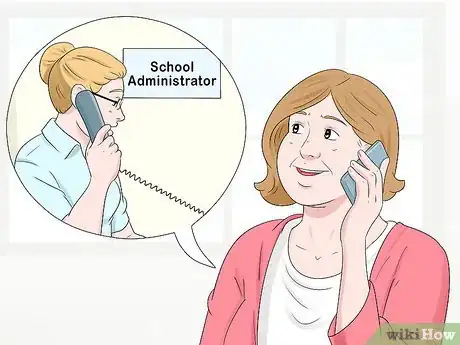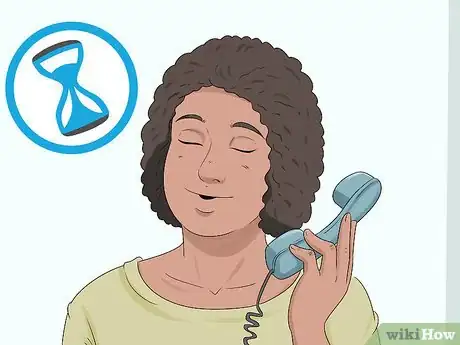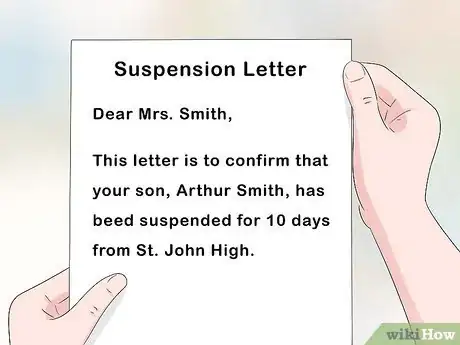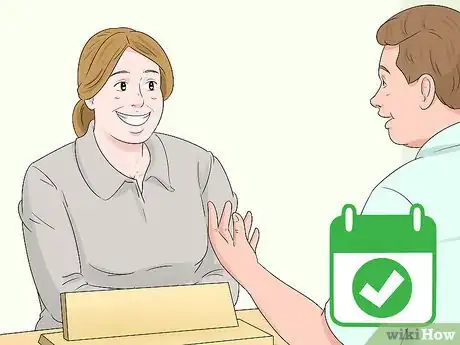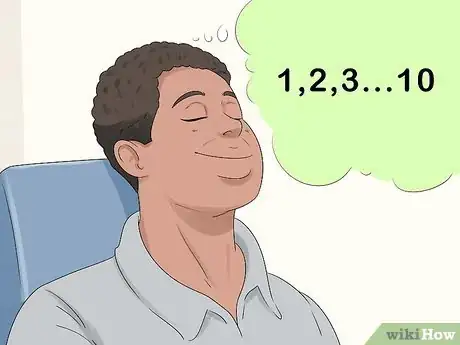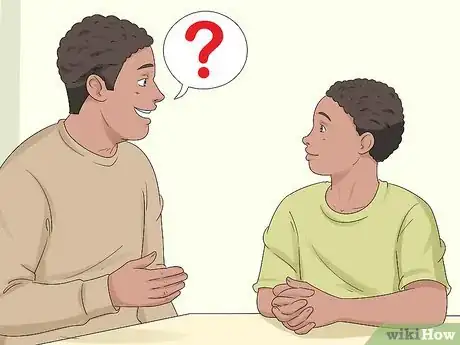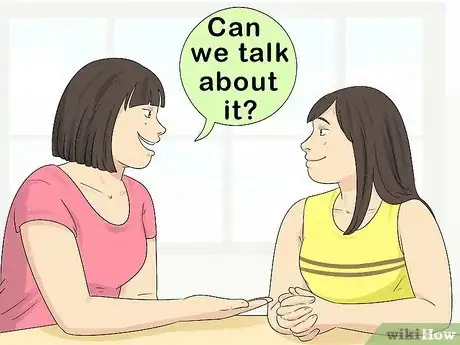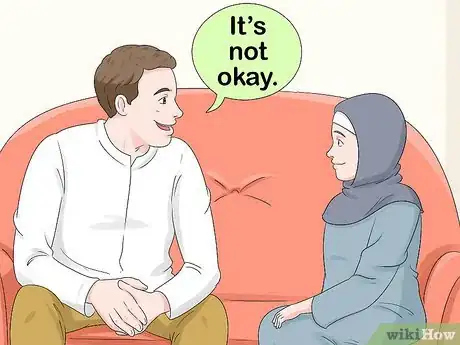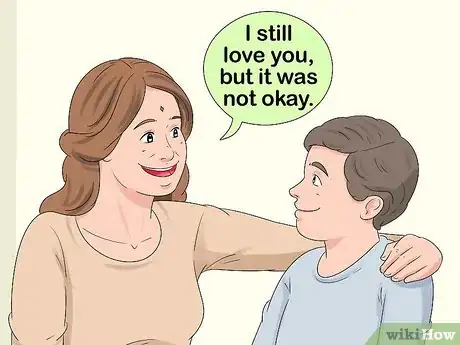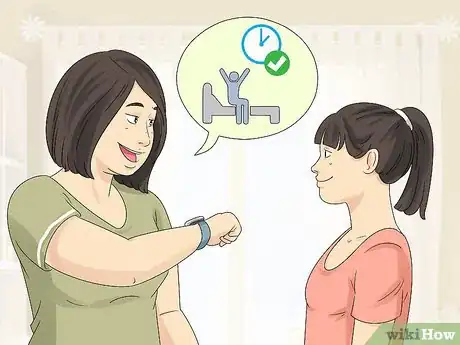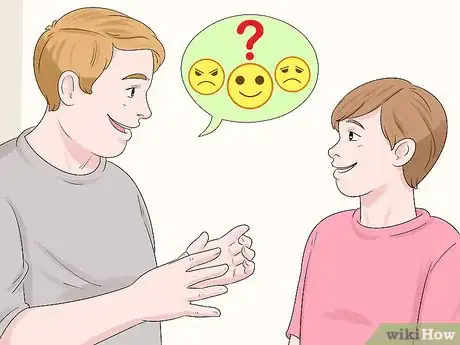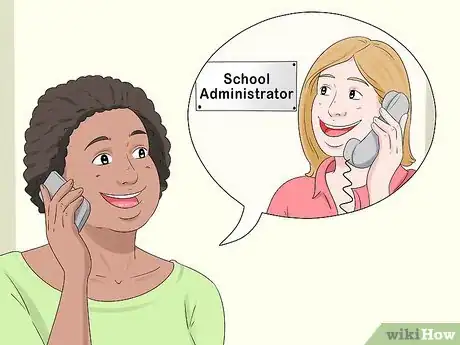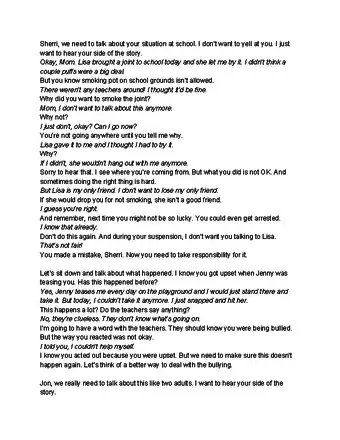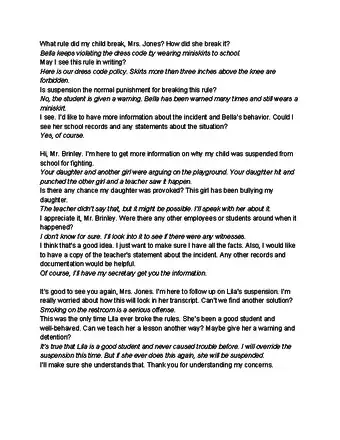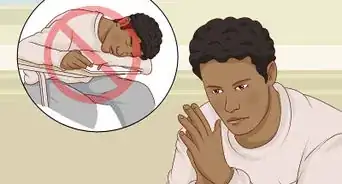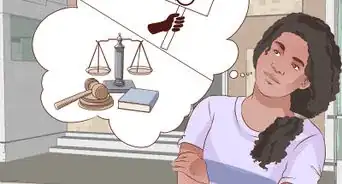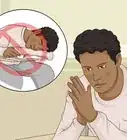This article was co-authored by Jacob Christenson, PhD, LMFT and by wikiHow staff writer, Amy Bobinger. Dr. Jacob Christenson is a Licensed Marriage and Family Therapist and the CEO of Covenant Family Solutions. With more than 20 years of experience, he specializes in substance abuse issues, parenting, medical family therapy, couples counseling, family therapy, and counseling for treatment-resistant adolescents. Dr. Christenson has also been published in many peer-reviewed journals, including Contemporary Family Therapy: An International Journal and Journal of Marital and Family Therapy. He is an AAMFT Approved Supervisor for the American Association for Marriage and Family Therapy (AAMFT) and a Clinical Fellow for the Iowa Association for Marriage and Family Therapy (IAMFT). Dr. Christenson holds a BS in Psychology from California Polytechnic State University, an MS and PhD in Marriage and Family Therapy from Brigham Young University, and an MBA from The University of the People.
There are 7 references cited in this article, which can be found at the bottom of the page.
This article has been viewed 145,731 times.
If your child is suspended from school, you might feel shocked, disappointed, or angry. However, by staying calm, learning all the details about the suspension, and showing support to both the school and your child, you can help turn the suspension into a teachable moment.
Steps
Finding out What Happened
-
1Ask the school to explain to you exactly what happened. You must be notified of a suspension within 24 hours of the decision being made. When the school calls you to inform you that your child has been suspended, ask for the details of the incident, how long the suspension will last, and why suspension was the chosen punishment.[1]
-
2Don’t jump to any conclusions until you have all of the facts. It can be easy to automatically assume the school isn’t taking the necessary time to address your child’s behavior issues. On the other hand, you might instantly assume your child is in the wrong. Avoid jumping to a conclusion until you hear all sides of the story.[2]Advertisement
-
3Request written documentation regarding the suspension. In most school districts, a student can only be suspended under specific circumstances, such as when other disciplinary actions have failed or the student places themselves or others in danger. Ask that the school provide you with a written explanation of your child’s actions as well as the specific rule that was broken.[3]
- Having written documentation will help you to process the information later after your emotions have cooled down. It will also help make sure that you and the school are on the same page about the incident(s) leading up to the suspension.
-
4Schedule a face-to-face meeting if you need more information. If you don't feel like the school’s explanation and written documentation answers all of your questions about the suspension, call the school and schedule a meeting with the principal or the teacher involved.[4] Write down all of the questions that you have before the meeting to make sure you don’t forget anything.[5]
- It’s best that your child doesn’t attend this meeting to avoid sending the message that you don’t support the school’s decision.
-
5Try to stay calm and cooperate with the school even if you feel angry. You might feel angry at your child, or you might feel angry because you feel the school treated your child unfairly. Try to remember that it’s important to set an example for your child by controlling your behavior. When you start to feel angry, count to 10 and take several deep breaths to calm yourself before you react.[6]
Talking to Your Child About What Happened
-
1Wait until you and your child are both calm. If you are called to the school immediately following an incident, you and your child might both be feeling a lot of intense emotions. Let your child know that they can expect a conversation about what happened after you’ve both calmed down.[7]
- Depending on what time of day the suspension occurred, you may want to go home and prepare dinner before you talk, or you might want to stop somewhere and eat lunch. Focusing on an activity will help you to be calm and it will give your child time to reflect.
-
2Ask your child to tell their side of the story. Offering your child the opportunity to explain themselves will send the message that you care about them.[8] Keep in mind that children and teenagers will usually bend a story somewhat to portray themselves in the best light, so you may need to take their story with a grain of salt.
- If your child’s story is very different from the school’s, try to find other students or teachers who witnessed the event to find out what really happened.
-
3Ask your child if they are having other problems you don’t know about. Sometimes when children and teenagers act out, it’s a symptom of another issue. Your child may be experiencing bullying, or they may be having health, vision, or hearing problems, struggles with their mental health, or even issues with drugs or alcohol.
- Try asking, “I know you got upset when you were told to sit down in class, but it seems like something else might be bothering you. Can we talk about it?”
-
4Help your child understand why what they did was wrong. Once you understand all of the sides of the situation, talk to your child about what they did that they shouldn’t have. Ask questions like “Do you think what you did was okay?” Some things will be obvious, like being suspended for skipping school, but other situations might be more of a grey area, like pushing another student who was acting like a bully.[9]
-
5Talk to your child about how they could have handled things differently. Use the suspension as a teachable moment. Help your child come up with ideas for how they could have reacted differently when they felt upset or angry.[10]
- Ask your child to walk back through the steps leading up to the incident. When they get to the part where they misbehaved, stop and ask, “Can you describe exactly how you were feeling right then? How could you have expressed that instead of what you did?”
Supporting the School's Decision
-
1Be supportive of your child but enforce the school’s decision. Let your child know that you love them and that bad behavior isn’t going to change that, but that they will still have to abide by the school’s disciplinary action. Positive discipline like this will help your child understand that what they did was wrong, but that they are not necessarily a “bad” person.[11]
- Tell your child something like, “Even though you got in trouble at school, I still love you. I know you acted out because you were feeling very upset. Everyone gets upset sometimes, and that’s okay, but your behavior was not okay."
-
2Make sure your child sticks to a routine while they are out of school. Don’t let your child’s suspension turn into a vacation. Make sure they get out of bed at the same time they would have to for school, and that they go to bed at the same time that they would on a school night. This will make it easier to get back in a normal routine when they return to school.[12]
- Try to stick as closely as possible to the meal times your child would have if they were at school. Plan out a schedule where your child eats breakfast, works on school assignments, eats lunch at their regular time, then helps out around the house in the afternoon.
-
3Ensure your child completes their schoolwork while they’re suspended. Most schools will assign some work for the student to complete during their suspension so they don’t fall too far behind in class. Make sure your child finishes their assigned work each day. You might even want to take them to the library to get some supplementary reading on the subjects they’re studying to send the message that their education is a priority to you.
-
4Teach your child new coping skills. Use this incident to help your child learn new ways to cope with their anger or frustration. Talk to them about how to express their feelings, including words to describe their emotions, like “mad,” “frustrated,” “anxious,” and “overwhelmed.” Sometimes children act out because they don’t know else to show their feelings.[13]
-
5Follow up with the school as needed. You may need to attend a meeting with the school’s administration before your child is allowed to return to school. Even if this isn’t necessary, you may want to call to touch base with the school about a week after your child returns to school to ask if they are behaving in class.[14]
Conversation Help
Expert Q&A
-
QuestionWhat should I do if my child gets suspended?
 Jacob Christenson, PhD, LMFTDr. Jacob Christenson is a Licensed Marriage and Family Therapist and the CEO of Covenant Family Solutions. With more than 20 years of experience, he specializes in substance abuse issues, parenting, medical family therapy, couples counseling, family therapy, and counseling for treatment-resistant adolescents. Dr. Christenson has also been published in many peer-reviewed journals, including Contemporary Family Therapy: An International Journal and Journal of Marital and Family Therapy. He is an AAMFT Approved Supervisor for the American Association for Marriage and Family Therapy (AAMFT) and a Clinical Fellow for the Iowa Association for Marriage and Family Therapy (IAMFT). Dr. Christenson holds a BS in Psychology from California Polytechnic State University, an MS and PhD in Marriage and Family Therapy from Brigham Young University, and an MBA from The University of the People.
Jacob Christenson, PhD, LMFTDr. Jacob Christenson is a Licensed Marriage and Family Therapist and the CEO of Covenant Family Solutions. With more than 20 years of experience, he specializes in substance abuse issues, parenting, medical family therapy, couples counseling, family therapy, and counseling for treatment-resistant adolescents. Dr. Christenson has also been published in many peer-reviewed journals, including Contemporary Family Therapy: An International Journal and Journal of Marital and Family Therapy. He is an AAMFT Approved Supervisor for the American Association for Marriage and Family Therapy (AAMFT) and a Clinical Fellow for the Iowa Association for Marriage and Family Therapy (IAMFT). Dr. Christenson holds a BS in Psychology from California Polytechnic State University, an MS and PhD in Marriage and Family Therapy from Brigham Young University, and an MBA from The University of the People.
Licensed Marriage and Family Therapist The first thing you should do is talk to the people involved to really understand what happened. That's the only way you'll be able to guide your child to address or deal with the same situation in the future, especially if your kid didn't really understand what was happening.
The first thing you should do is talk to the people involved to really understand what happened. That's the only way you'll be able to guide your child to address or deal with the same situation in the future, especially if your kid didn't really understand what was happening.
References
- ↑ Jacob Christenson, PhD, LMFT. Licensed Marriage and Family Therapist. Expert Interview. 22 October 2021.
- ↑ Jacob Christenson, PhD, LMFT. Licensed Marriage and Family Therapist. Expert Interview. 22 October 2021.
- ↑ http://www.iser.com/resources/school-suspension.html
- ↑ Jacob Christenson, PhD, LMFT. Licensed Marriage and Family Therapist. Expert Interview. 22 October 2021.
- ↑ http://www.iser.com/resources/school-suspension.html
- ↑ https://www.webmd.com/sex-relationships/features/anger-management-counting-to-ten
- ↑ Jacob Christenson, PhD, LMFT. Licensed Marriage and Family Therapist. Expert Interview. 22 October 2021.
- ↑ Jacob Christenson, PhD, LMFT. Licensed Marriage and Family Therapist. Expert Interview. 22 October 2021.
- ↑ https://www.workingmother.com/content/discipline-solution/
- ↑ https://www.workingmother.com/content/discipline-solution/
- ↑ http://www.pbs.org/parents/talkingwithkids/positive_discipline_tips.html
- ↑ https://www.huffingtonpost.com/2013/07/11/kids-bedtimes_n_3580201.html
- ↑ https://www.parents.com/toddlers-preschoolers/discipline/anger-management/helping-kids-handle-anger/
- ↑ Jacob Christenson, PhD, LMFT. Licensed Marriage and Family Therapist. Expert Interview. 22 October 2021.
